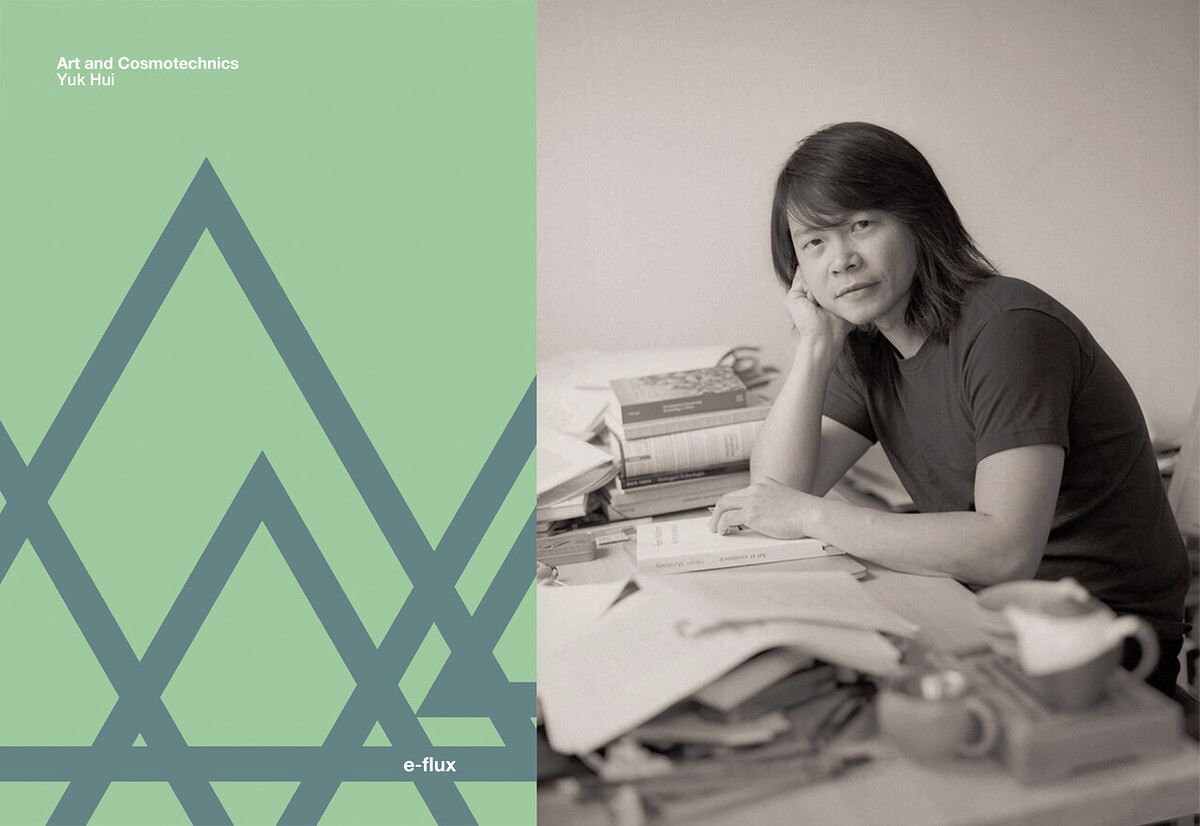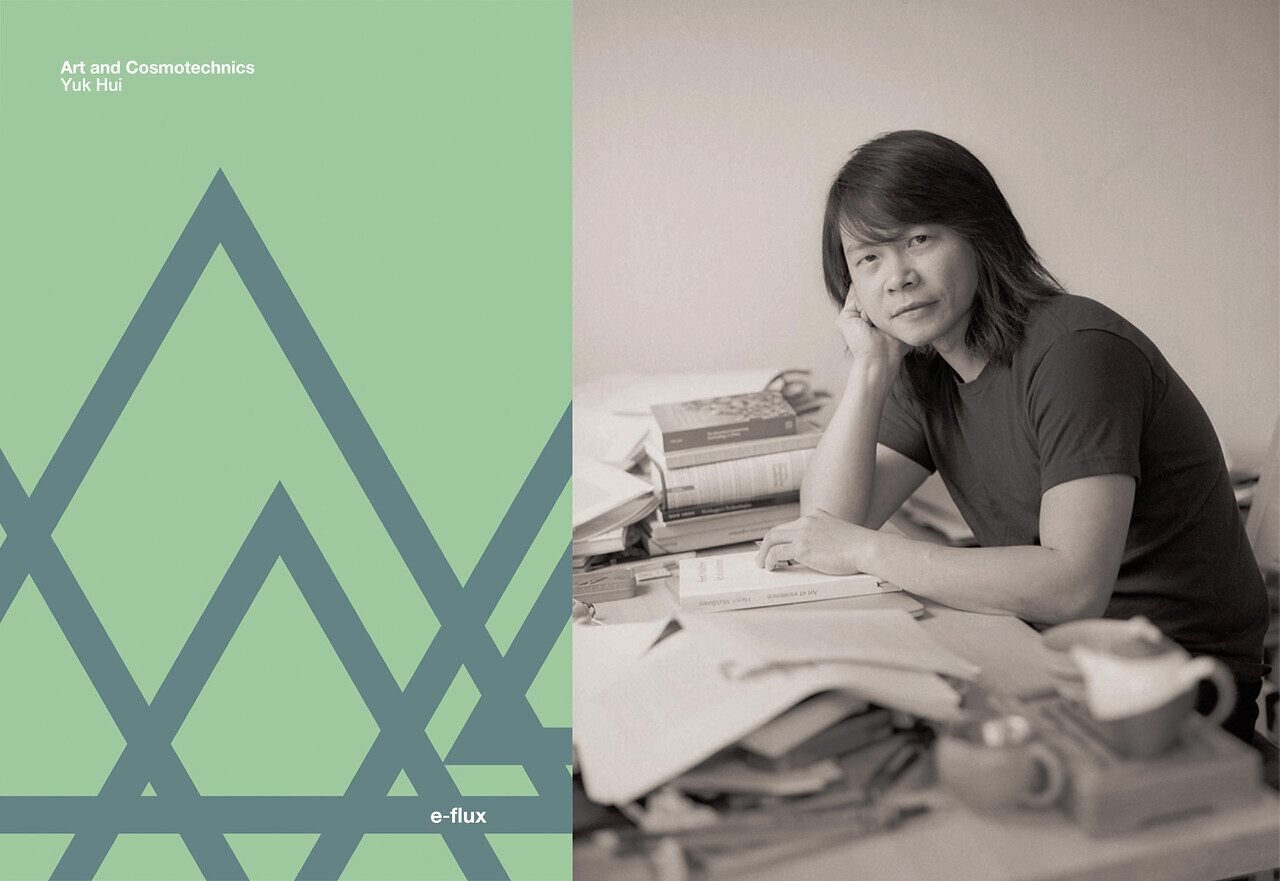Yuk Hui
In conversation with Brian Kuan Wood
November 18, 2021, 7:30pm
Please join us for a conversation between Yuk Hui and Brian Kuan Wood to celebrate the launch of Hui’s new book, Art and Cosmotechnics (2021), out now from e-flux Books and University of Minnesota Press. Order the book here.
“This book opens the way to rethinking technology beyond Gestell, by exploring the obscure paths of the experience of art.”
—Augustin Berque, author of Thinking Through Landscape
“Scientific thinking wants to improve the capacity of the senses, while philosophical thinking wants to develop other senses. It is in art that both can be united. Therefore, the relation between art and technology is not yet determined.”
—Yuk Hui, from Art and Cosmotechnics
In light of current debates on robotics and AI, how can various experiences of art help us rethink technology today?
How can today’s art, overshadowed by global trends and market forces, reestablish a relation to truth—even when that relation has come to be dominated by science and technology? Coursing through Greek tragedy, cybernetic logic, and the aesthetics of Chinese shanshui (mountain and water) painting, Art and Cosmotechnics addresses the challenge that technological transformation poses to art and philosophy now. At this historical point, it is a vital imperative to rearticulate the relationship between art and discourses on AI and robotics. But where to begin? In his latest book, Hong Kong-based philosopher Yuk Hui proposes to go back to the varieties of experience in art.
Hui’s previous studies on the history of Eastern and Western technological thought expand the very concept of technology itself. In The Question Concerning Technology in China: An Essay in Cosmotechnics (2016), Hui contests the Western-European universal view of technology by arguing for a technodiversity grounded in the cultural practices that make any technical system possible in the first place. In Recursivity and Contingency (2019), Hui engages with cybernetics as a world-historical political and philosophical break in the history of Western thought. Art and Cosmotechnics—out now from e-flux Books and University of Minnesota Press—proceeds to ask how cosmotechnics can provide new conceptual tools for understanding the relation between art and technology today.
Art and Cosmotechnics departs from Hegel’s “end of art” thesis and Heidegger’s claim that cybernetics heralds the “end of European philosophy and metaphysics.” Hui’s book asks what such a post-European relation between art and technology might actually be. Instead of interpreting Heidegger’s verdict as a catastrophic end, or an opening for anti-European reactionary thinking, Hui proposes another agenda for reformulating the task of thinking, which he demonstrates by strategically elevating aesthetics—traditionally defined as a lower faculty of cognition—to logic.
To prepare for renewing the relation between art and technology, Art and Cosmotechnics takes readers to an unfamiliar world in which tragic drama confronts shanshui painting, German Idealism mirrors cybernetics and conceptual art, and Hegelian dialectics contrasts Daoist logic. Through Hui’s particular reading of Laozi, Wang Bi, and Mou Zongsan, how can the logic of xuan be said to operate in Chinese shanshui painting? How does such a logic differ from that of Greek tragedy in its dynamics of disclosure and de-mystification? After reflecting on art and its varieties of experience, Art and Cosmotechnics asks how a systematic recomposition of thinking can mount a new approach to the closed world of modern industrial machines and transform their logic of capture and containment, shedding new light in a destitute time.
Yuk Hui wrote his doctoral thesis under the French philosopher Bernard Stiegler (1952–2020) at Goldsmiths College in London and obtained his Habilitation in philosophy from Leuphana University in Germany. Hui is author of several monographs that have been translated to a dozen languages, including On the Existence of Digital Objects (2016), The Question Concerning Technology in China:An Essay in Cosmotechnics (2016) and Recursivity and Contingency (2019). Hui has been the convenor of the Research Network for Philosophy and Technology since 2014 and a juror of the Berggruen Prize for Philosophy and Culture since 2020. He currently teaches at the City University of Hong Kong.

